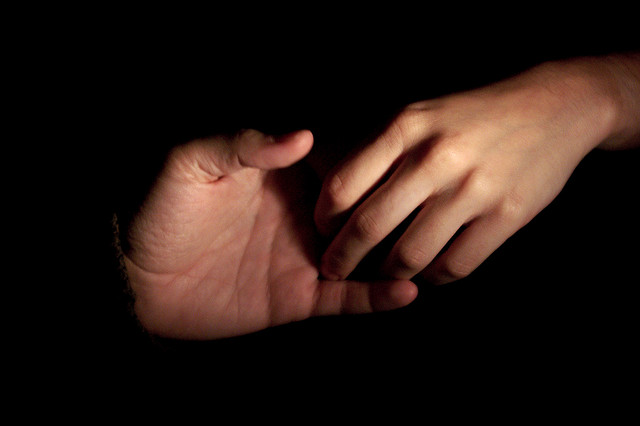
I was born with a rare genetic illness called EDS (Ehlers-Danlos Syndrome) which has no cure and little treatment.
I suffer from severe and intractable chronic pain from joint dislocations on a daily basis, and it affects not only me, but also those around me.
I also suffer from Bipolar Disorder and Anxiety.
I know I cannot change these things, and must accept them, even though acceptance is a difficult process.
We all get sick or hurt from time to time—and most of the time it’s out of our control. I have found that my response to illness can often be misplaced and directed towards others—whether I can control these things or not.
An illness is benign. This is not to say it does not hurt, however it has no intention to hurt. It has no malice. It has no human characteristics—unless we place them on it.
When I find myself giving in to the pain, and becoming so worked up that the pain and anxiety go into a feedback loop, I can lash out at others. This is a very common situation: stress exacerbating illness.
It is also common in animals. A frightened, hurt rabbit will not gladly accept your loving hands, but rather scramble in fear—and potentially scratch or hurt you in the process by trying to get away.
The actions of the animal are not malicious, nor are they good. They are just an aspect of behavior which has been molded through a fear and pain response. We as humans are no different. When we hurt, we notify others through our words and actions—we all have our own language when it comes to illness.
How we decide to handle these factors which we cannot control- this is what determines whether or not we will get any better.
Recently, I was lucky enough to come across a spiritual healing ceremony called Hoʻoponopono.
Being the anthropologist that I am, I researched it and learned about the cultures from which it arose as well as the process of the ceremony itself and the results for those involved.
I have brought it into my life, and the lives of those around me. And it has brought peace and understanding to something we cannot control and must accept that we cannot control—an illness of any kind.
Hoʻoponopono originated in the South Pacific. The cultural idea is represented by a Hawaiian word, but geographically it stretches as far as New Zealand with the Maori tribe.
Hoʻoponopono is way to heal everyone touched by illness. Manifestations of pain and suffering that arise during the course of a severe illness can present themselves in the not only the sick person, but in caretakers, family and other loved ones.
It is difficult to protect yourself when you only live to heal the other person, and they feel guilt for not being able to protect you either. I have found others resenting me because I am perceived as a burden—or at least I feel that I am. These thoughts may be temporary, but the feelings of hurt can be residual, and the guilt and shame are intense emotions.
The words in the Ho’oponopono are important because they apply to the sick as well as the caretakers and loved ones.
Ho’ponopono is a way to bridge the divide of pain between them, caused by an illness which hurts not only the person affected, but also those who love and take care of them. This kind of pain is calmed and relieved through acceptance, love and forgiveness.
I have found Ho’ponopono to be remarkably effective in my own life. I reminds me that I am not my disease, and I am not hurting others—rather it is the manifestation of this disease which causes me to do so. I have to take responsibility for that, and then let it go.
This is how to perform Ho’ponopono with your loved ones:
Face each other, hold hands and look into one another’s eyes—if you are comfortable doing so—and then say the following:
I’m sorry that this illness has caused you hurt.
Please forgive me if I have let the illness carry me away. I know it is not your fault.
Thank you for being the one I love, for taking care of me, being there for me, but also for letting me take care of you.
I love you for everything you are, were, and aspire to be—and always will, no matter what.
Then both close your eyes and, to yourself, say:
I’m sorry that this illness has caused you hurt.
Please forgive me if I have let the illness carry me away. I know it is not your fault.
Thank you for being the one I love, for taking care of me, being there for me, but also for letting me take care of you.
I love you for everything you are, were, and aspire to be—and always will, no matter what.
If the words were true and spoken with good intention, spiritual and emotional healing is possible.
After all, compassion and love—towards others and ourselves—are the two most important factors in healing.
~
Relephant:
21 Things People with Chronic Pain Want you to Know.
Author: Kristen Medchill
Editor: Evan Yerburgh
Image: Josep Ma Rosell/ Flickr










Read 2 comments and reply